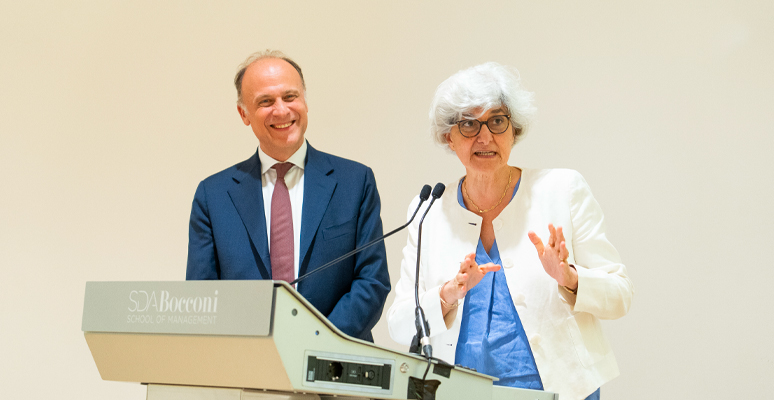
- Start date
- Duration
- Format
- Language
- 23 Set 2025
- 40 hours
- Online
- Italian
Il corso intende fornire tutte le competenze necessarie a padroneggiare e applicare i principali strumenti e framework esistenti in materia di sustainability reporting.
The need for a Capital Market Union and for an active role of the private sector to achieve this goal was the underlying motif of the Influence Relevance & Growth Conference, which was held in Europe for the first time on May 8th at SDA Bocconi School of Management.
The starting point of the discussion between European and American businessmen and academics was the economic and political role of Europe, which, over the course of about twenty years, has seen its companies and banks disappear from the rankings of the world's largest organizations.
In order to be relevant and influential on the global stage and to compete on equal terms with the United States and China, Europe needs to grow sustainably, fostering globally-sized enterprises in geopolitically critical industries.
The importance of the single capital market was emphasized by Stefano Caselli, Dean of SDA Bocconi (“The Banking Union is necessary to achieve a Capital Market Union, but the latter does not only concern the banking industry, but an entire ecosystem that can enable the Continent's businesses to become larger and more competitive”), the CEO of Borsa Italiana, Fabrizio Testa (“The biggest obstacle to its achievement is tax competition between countries”), Sylvie Goulard, Professor in Global Affairs and Geopolitics, SDA Bocconi (“A common industrial policy and defense are impossible without the financial resources that a capital market Union would provide”), and the Deputy Governor of the Bank of Italy, Alessandra Perrazzelli (“New technologies could help achieve the goal, but at the same time raise opportunities and issues”), and Vittorio Grilli.
Professor Caselli added that the lever to use to have more efficient markets is taxation, which can create incentives to shift savings among different assets.
Corrado Passera, CEO of illimity, emphasized the role that private companies can play in moving towards a single market, as did William E. Mayer, Chairman Emeritus of the Aspen Institute, who, among the few examples of successful European collaborations highlighted Airbus. Jeffrey Libshutz, Managing Partner of ArmaVir Partners, underscored the need for collaboration between the public and private sectors to overcome the fragmentation of the telecommunications sector, which must compete with fewer and larger Chinese and American competitors. The theme of collaboration was also addressed by Michael B. G. Froman, President of the Council on Foreign Relations (“There must be a relationship of mutual trust and understanding between the public and private sectors”).
Trust was also the central aspect of the media dialogue that emerged between Marinella Soldi, Chairwoman of RAI and Board Member of BBC, and KC Sullivan, President of CNBC. Public trust can be obtained by explicitly stating one's information processing methods and avoiding falling into the trap of polarization triggered by algorithms that tend to offer readers content in line with their beliefs.
The need for infrastructure integration was discussed by Luigi Ferraris, CEO of Ferrovie dello Stato Italiane Group, and Jules Goffre, Board Member of Symanto and Partner Emeritus of Kearney. Europe, despite some disparities, has an enviable railway network, while it lags far behind in the development of everything that can support the use of artificial intelligence.
Francesco Billari, Rector of Bocconi University, emphasized the importance of education and knowledge for development. On one hand, large American technology companies often grow around major universities, and on the other hand, research shows that graduates tend to prefer longer-term policies, thus favoring sustainability.
At the opening of the event, organized by SDA Bocconi, Newest, the Aspen Institute, and the Aspen Institute Italia, Giulio Tremonti, President of Aspen Italia, emphasized the similarities between the current situation and the equally complicated Mundus furiosus of the sixteenth century.
SDA Bocconi School of Management

Il corso intende fornire tutte le competenze necessarie a padroneggiare e applicare i principali strumenti e framework esistenti in materia di sustainability reporting.

Il corso offre strumenti e metodologie utili a introdurre una visione strategica della gestione del personale.

